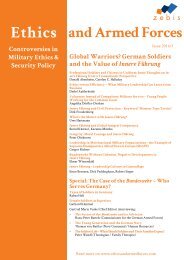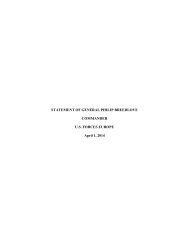FULLTEXT01
FULLTEXT01
FULLTEXT01
You also want an ePaper? Increase the reach of your titles
YUMPU automatically turns print PDFs into web optimized ePapers that Google loves.
TACTICAL THOUGHT<br />
2014 September 29 th<br />
First, my experience is that a single officer can have a strong impact on the military<br />
system as a whole. Secondly, my interest in Bourdieu can be traced to his background in<br />
Algeria during the insurgency in the 50s; his critics in the academia were mostly<br />
uninterested in deeper self-reflection and criticised his endeavours in the practical use of<br />
academic research. My experience of a limited interest in military sociology in Swedish<br />
officer education and my interest in methodological development for War Studies can<br />
also be traced to the encounter with Bourdieu. I believe that it is important to analyse<br />
relations between the standpoints and background factors, for example, officers' roles,<br />
rank, unit affiliation and education. I believe that such an approach is important to be<br />
incorporated in the thinking for research development of War Studies research.<br />
In summary, the above reasons and motives applied to my thinking in general, and I<br />
decided to proceed with an adaption of the Bourdieu approach of field theory. To<br />
summarize the theoretical basis; I have a constructionist approach with my ontological<br />
perspective. Regarding the literature study; a Begriefsgesichte approach is discussed<br />
with Koselleck’s experience and expectation concept. Finally, the empirical analysis of<br />
standpoints and background factors are discussed with a field theory approach. With<br />
these theoretical notions, we now turn to the methodology descriptions.<br />
2.4 Methodology<br />
The study uses three methodological approaches. First; a qualitative textual and content<br />
analysis of a conceptual history approach for the literature study. Secondly; interviews<br />
with open-ended questions and multi-choice answers for data collection from the<br />
officers. 113 Finally, the main method for the investigation is a so-called sociological<br />
prosopography, meaning, collecting and analysing data concerning the structured<br />
pattern of officers’ standpoints and background factors. 114 Concepts, such as capital and<br />
field developed by Bourdieu and his collaborators and followers, are used as tools in the<br />
work.<br />
The textual analysis is described in the appendixes presenting the literature study and<br />
the normative doctrine analysis. 115 The sociological prosopography analysis of<br />
standpoints, background factor positions and relational structure has been done using<br />
Multiple Correspondence Analysis (MCA). MCA is a method particularly suitable for<br />
analysis, combining different kinds of aspects as they do here, i.e. relational structures<br />
of standpoints and background factors.<br />
113 Appendix 2. The Interview Guide.<br />
114 Donald Broady, ´French prosopography. Definition and suggested readings´, Poetics Volume 30,<br />
Issues 5-6, October-December 2002, pp. 381-385, digital version at<br />
http://www.skeptron.uu.se/broady/sec/p-broady-0605-frenchprosop.htm<br />
115 Appendix1. The Literature Study and Appendix 8. Results from a Doctrine study on tactics in COIN.<br />
34





